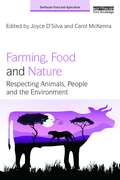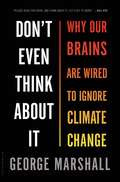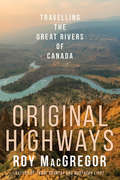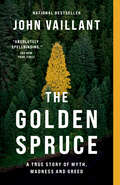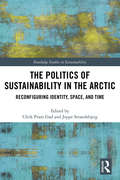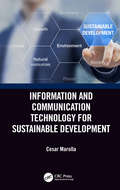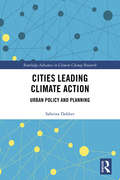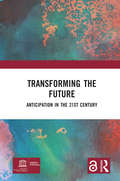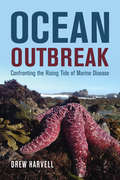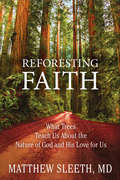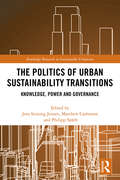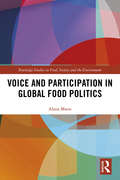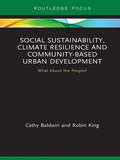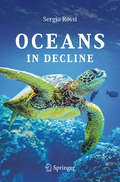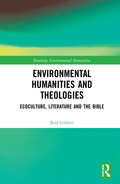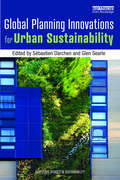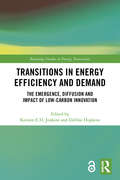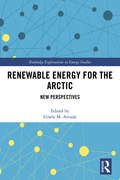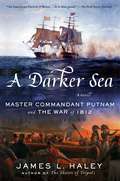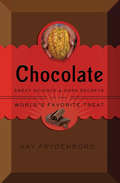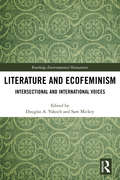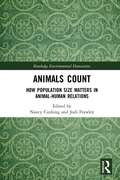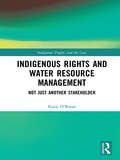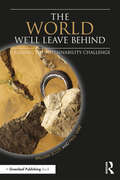- Table View
- List View
Farming, Food and Nature: Respecting Animals, People and the Environment (Earthscan Food and Agriculture)
by Joyce D'Silva Carol McKennaLivestock production and its use of finite resources is devastating biodiversity and pushing wildlife to the brink of extinction. This powerful book examines the massive global impact caused by intensive livestock production and then explores solutions, ranging from moving to agroecological farming to reducing consumption of animal products, including examples of best practice and innovation, both on land and within the investment and food industries. Leading international contributors spell out the problems in terms of planetary limits, climate change, resources, the massive use of cereals and soy for animal feed, and the direct impact of industrial farming on the welfare of farmed animals. They call for an urgent move to a flourishing food system for the sake of animals, the planet and us. Some offer examples of global good practice in farming or the power of the investment community to drive change, and others highlight food business innovation and exciting developments in protein diversification. Providing a highly accessible overview of key issues, this book creates a timely resource for all concerned about the environmental, social and ethical issues facing food, farming and nature. It will be an invaluable resource and provide inspiration for students, professionals, non-governmental organisations (NGOs) and the general reader.
Don't Even Think About It: Why Our Brains are Wired to Ignore Climate Change
by George MarshallMost of us recognize that climate change is real, and yet we do nothing to stop it. What is this psychological mechanism that allows us to know something is true but act as if it is not? George Marshall's search for the answers brings him face to face with Nobel Prize-winning psychologists and the activists of the Texas Tea Party; the world's leading climate scientists and the people who denounce them; liberal environmentalists and conservative evangelicals. What he discovered is that our values, assumptions, and prejudices can take on lives of their own, gaining authority as they are shared, dividing people in their wake. <P><P>With engaging stories and drawing on years of his own research, Marshall argues that the answers do not lie in the things that make us different and drive us apart, but rather in what we all share: how our human brains are wired-our evolutionary origins, our perceptions of threats, our cognitive blindspots, our love of storytelling, our fear of death, and our deepest instincts to defend our family and tribe. Once we understand what excites, threatens, and motivates us, we can rethink and reimagine climate change, for it is not an impossible problem. Rather, it is one we can halt if we can make it our common purpose and common ground. Silence and inaction are the most persuasive of narratives, so we need to change the story. <P><P>In the end, Don't Even Think About It is both about climate change and about the qualities that make us human and how we can grow as we deal with the greatest challenge we have ever faced.
Original Highways: Travelling the Great Rivers of Canada
by Roy MacgregorExpanding on his landmark Globe and Mail series in which he documented his travels down 16 of Canada's great rivers, Roy MacGregor tells the story of our country through the stories of its original highways, and how they sustain our spirit, identity and economy--past, present and future.No country is more blessed with fresh water than Canada. From the mouth of the Fraser River in BC, to the Bow in Alberta, the Red in Manitoba, the Gatineau, the Saint John and the most historic of all Canada's rivers, the St. Lawrence, our beloved chronicler of Canadian life, Roy MacGregor, has paddled, sailed and traversed their lengths, learned their stories and secrets, and the tales of centuries lived on their rapids and riverbanks. He raises lost tales, like that of the Great Tax Revolt of the Gatineau River, and reconsiders histories like that of the Irish would-be settlers who died on Grosse Ile and the incredible resilience of settlers in the Red River Valley. Along the Grand, the Ottawa and others, he meets the successful conservationists behind the resuscitation of polluted wetlands, including even Toronto's Don, the most abused river in Canada (where he witnesses families of mink, returned to play on its banks). Long before our national railroad was built, our rivers held Canada together; in these sixteen portraits, filled with yesterday's adventures and tomorrow's promise, MacGregor weaves together a story of Canada and its ongoing relationship with its most precious resource.
The Golden Spruce: A True Story of Myth, Madness and Greed
by John VaillantThe Golden Spruce is the story of a glorious natural wonder, the man who destroyed it, and the fascinating, troubling context in which his act took place. A tree with luminous glowing needles, the golden spruce was unique and, biologically speaking, should never have reached maturity; Grant Hadwin, the man who cut it down, was passionate, extraordinarily well-suited to wilderness survival, and to some degree unbalanced. But as John Vaillant shows, the extraordinary tree stood at the intersection of contradictory ways of looking at the world; the conflict between them is one reason it was destroyed. Taking in history, geography, science and spirituality, this book raises some of the most pressing questions facing society today. The golden spruce stood in the Queen Charlotte Islands (Haida Gwaii), an unusually rich ecosystem where the normal lines between species blur. Without romanticizing, Vaillant shows that this understanding is typified by the Haida, the native people who have lived there for millennia, and for whom the golden spruce was an integral part of their history and mythology. But seen a different way, the golden spruce stood in block 6 of Tree Farm License 39. Grant Hadwin had worked as a remote scout for timber companies. But over time Hadwin was pushed into a paradox: the better he was at his job, the more the world he loved was destroyed. On January 20, 1997, with the temperature near zero, Hadwin swam across the Yakoun River with a chainsaw. He tore into the golden spruce, leaving it so unstable that the first wind would push it over. A few weeks later, Hadwin set off in a kayak across the treacherous Hecate Strait to face court charges. He has not been heard from since.Vaillant describes Hadwin’s actions in engrossing detail, but also provides the complex environmental, political and economic context in which they took place. The Golden Spruce forces one to ask: can the damage our civilization exacts on the natural world be justified?
The Politics of Sustainability in the Arctic: Reconfiguring Identity, Space, and Time (Routledge Studies in Sustainability)
by Jeppe Strandsbjerg Ulrik Pram GadThe Politics of Sustainability in the Arctic argues that sustainability is a political concept because it defines and shapes competing visions of the future. In current Arctic affairs, prominent stakeholders agree that development needs to be sustainable, but there is no agreement over what it is that needs to be sustained. In original conservationist discourse, the environment was the sole referent object of sustainability; however, as sustainability discourses have expanded, the concept has been linked to an increasing number of referent objects, such as society, economy, culture, and identity. This book sets out a theoretical framework for understanding and analysing sustainability as a political concept, and provides a comprehensive empirical investigation of Arctic sustainability discourses. Presenting a range of case studies from Greenland, Norway, Canada, Russia, Iceland, and Alaska, the chapters in this volume analyse the concept of sustainability and how actors are employing and contesting this concept in specific regions within the Arctic. In doing so, the book demonstrates how sustainability is being given new meanings in the postcolonial Arctic and what the political implications are for postcoloniality, nature, and development more broadly. Beyond those interested in the Arctic, this book will also be of great value to students and scholars of sustainability, sustainable development, and identity and environmental politics.
Information and Communication Technology for Sustainable Development
by Cesar MarollaInformation and Communication Technology for Sustainable Development shows how ICT, as an enabler for all spheres of development, can help innovate business processes and operations, and provide faster integration of new technologies into business systems. Focused on sustainability, the book addresses strategic approaches to cope with a range of climatic, environmental, cyber-security threats and other global risks, and aims to promote prosperity and economic growth. Furthermore, it explores how the adoption of new technologies, and collective action based upon a strategic behavioral theory of new leadership, can be applied when responding to specific set of conditions that allow for the proposed strategies to cope with risks. Information technology and strategic planning complement each other to attain the sustainable development goals (SDGs). Risk management frameworks, business continuity systems, and strategic planning methodologies such as mechanism design theory, strategic adaptive cognition (SAC), and risk mechanism theory (RMT) are the fundamental components needed to have a universal approach embedded into the national development plans agenda. As technology no longer follows an orderly, linear path, but improves exponentially, developing a strategic approach to ICT implementation help world leaders in the difficult but inspiring task of making a sustainable world and consequently find solutions to achieve the SDGs and the desired growth pattern that must be sustained, inclusive and equitable. Features: Discusses for the first time the potential of ICT as a transformative power in finding solutions to climatic and economic issues. Illustrates comprehensive strategic planning for leaders to implement in both public and private organizations. Integrates standards and frameworks in the context of sustainable development along with the UN Sustainable Development Goals. Describes in detail how mechanism design, risk management, business continuity systems, a comprehensive strategic planning using SAC (Strategic Adaptive Cognition) and risk mechanism theory can be used to address environmental risks and attain sustainable development goals (SDGs). Explains eHealth as an adaptation strategy to address future changes in climate and impacts, and the links between mitigation and adaptation to ICTs.
Cities Leading Climate Action: Urban Policy and Planning (Routledge Advances in Climate Change Research)
by Sabrina DekkerThis book provides local governments and interested stakeholders with insights into the challenges and opportunities inherent in addressing climate change. Drawing on in-depth case study research on Vancouver, Portland, Glasgow and Dublin, Dekker examines the policy development processes employed by urban policy makers to respond to climate change, looking specifically at the utilisation of collaborative planning. Emerging from the case studies are lessons for local governments in relation to the role of organisational structure in supporting climate leadership; the importance of leadership, trust, relationship building and narratives for supporting ownership of the responses to climate change by stakeholders; and the need for creative and innovative public engagement to expand the reach of traditional methods such as social media and other technology-based solutions. Finally, Dekker reflects on her experience in the development of climate change action plans for the Dublin Local Authorities. This book will be of great relevance to students, scholars and policy makers with an interest in climate change resilience, environmental policy and urban planning.
Transforming the Future (Open Access): Anticipation in the 21st Century
by Riel MillerPeople are using the future to search for better ways to achieve sustainability, inclusiveness, prosperity, well-being and peace. In addition, the way the future is understood and used is changing in almost all domains, from social science to daily life. This book presents the results of significant research undertaken by UNESCO with a number of partners to detect and define the theory and practice of anticipation around the world today. It uses the concept of ‘Futures Literacy’ as a tool to define the understanding of anticipatory systems and processes – also known as the Discipline of Anticipation. This innovative title explores: • new topics such as Futures Literacy and the Discipline of Anticipation; • the evidence collected from over 30 Futures Literacy Laboratories and presented in 14 full case studies; • the need and opportunity for significant innovation in human decision-making systems. This book will be of great interest to scholars, researchers, policy-makers and students, as well as activists working on sustainability issues and innovation, future studies and anticipation studies. The Open Access version of this book, available at https://www.taylorfrancis.com/books/e/9781351047999, has been made available under a Attribution-NonCommercial-NoDerivs 3.0 IGO (CC-BY-NC-ND 3.0 IGO) license.
Ocean Outbreak: Confronting the Rising Tide of Marine Disease
by Drew HarvellThere is a growing crisis in our oceans as rates of infectious disease outbreaks are on the rise. Marine epidemics have the potential to cause a mass die-off of wildlife from the bottom to the top of the food chain, impacting the health of ocean ecosystems as well as lives on land. Fueled by sewage dumping, unregulated aquaculture, and drifting plastic in warming seas, ocean outbreaks are sentinels of impending global environmental disaster. Ocean Outbreak follows renowned scientist Drew Harvell and her colleagues as they investigate how four iconic marine animals—corals, abalone, salmon, and starfish—have been devastated by disease. Based on over twenty years of research, this firsthand account of the sometimes creeping, sometimes exploding impact of disease on our ocean’s biodiversity ends with a hopeful message. Through policy changes and the implementation of innovative solutions from nature, we can reduce major outbreaks, save some ocean ecosystems, and protect our fragile environment.
Reforesting Faith: What Trees Teach Us About the Nature of God and His Love for Us
by Matthew SleethThe Bible talks about trees more than any living creation other than people. Perhaps you've missed the forest...and the trees.In this groundbreaking walk through Scripture, former physician and carpenter Dr. Matthew Sleeth makes the convincing case why trees are essential to every Christian's understanding of God. Yet we've mostly missed how God has chosen to tell His story--and ours--through the lens of trees. There's a tree on the first page of Genesis and the last page of Revelation. The Bible refers to its wisdom as a Tree of Life (Proverbs 3:18). Every major Biblical character has a tree associated with them. Jesus himself says he is the true vine (John 15:1). A tree was used to kill Jesus--and a tree is the only thing the Messiah ever harmed. This is no accident. When we subtract trees from Scripture, we miss lessons of faith necessary for our growth. This is the rare book that connects those who love the Creator with creation, and those who love creation with the Creator. It offers inspirational yet practical ways to express our love for God--and our neighbors--by planting spiritual trees and physical trees in the world.Join Dr. Sleeth as he navigates the Bible's trail of trees to explore the wonders of life, death, and rebirth. You'll be amazed at how science is just beginning to catch up to the truths described in Scripture thousands of years ago. Once you discover the hidden language of trees, your walk through the woods--and through Scripture--will never be the same.
The Politics of Urban Sustainability Transitions: Knowledge, Power and Governance (Routledge Research in Sustainable Urbanism)
by Jens Stissing Jensen Matthew Cashmore Philipp SpäthCities, the world over, are increasingly recognised to be both a principal source of the environmental and social sustainability challenges facing contemporary society and a critical site for addressing these challenges. Socio-technical systems are at the heart of these challenges as they configure central aspects of urban life: from mobility and energy infrastructures to leisure activities and patterns of mobility. This observation has led to substantial interest in how societies might initiate and actively steer radical transitions in these systems in the pursuit of sustainable urban futures. This book contributes to emerging debates on the politics of urban transitions by examining the intimate interlinkages between knowledge, power and governance. Drawing upon real-world examples of urban governance, the authors explore the strategies, struggles and controversies involved in configuring knowledge and how knowledge constructions influence governance by rendering some concerns and issues visible and valuable, while obscuring others. The book draws attention to how novel ways of conceptualising, knowing and observing socio-technical systems may be harnessed productively in redefining the power relationships underpinning unsustainable practices. Understanding these dynamics can ultimately inform and enable new approaches to support much-needed urban transitions. This book provides a compelling examination of urban knowledge politics for the twenty-first century that will be of great value to academics, policy-makers and practitioners working in the social sciences, urban studies, geography, urban governance or sustainability transitions.
Voice and Participation in Global Food Politics (Routledge Studies in Food, Society and the Environment)
by Alana MannAs awareness of the commodification of food for profit at the expense of our health and the planet grows, this book foregrounds the communicative dimensions of resistance by food movements. Voice and participation are argued by the author to be the means through which rural and urban communities can, and in many cases do, resist the capture of value by corporate actors and work to democratise their foodscapes. Her critical analysis of meaning-making under neo-liberalism suggests that agroecology, as a socially activating form of agriculture within a food sovereignty framework, provides an example of social learning relevant across rural/urban and North/South divides. Embracing indigenous knowledge, gender equity and postcolonial theory, this approach mobilises growers and eaters to contest the power structures that shape their food environments, and also to focus on social and economic justice within their communities, particularly in the context of climate change. Participatory ecologies that incorporate these forms of social learning encourage the co-creation of inclusive foodscapes and politicise food justice. Such a positive framing of resistance through horizontal pedagogy, participation, communication and social learning processes contrasts with the vertical dissemination structure of the corporatised food regime and takes vital steps towards a more democratic food system. Voice and Participation in Global Food Politics will be of interest to scholars of agri-food, transdisciplinary food studies and political economy of food systems. It will also be of relevance to NGOs and policymakers.
Social Sustainability, Climate Resilience and Community-Based Urban Development: What About the People? (Routledge Focus on Environment and Sustainability)
by Cathy Baldwin Robin KingUrban communities around the world face increased stress from natural disasters linked to climate change, and other urban pressures. They need to grow rapidly stronger in order to cope, adapt and flourish. Strong social networks and social cohesion can be more important for a community’s resilience than the actual physical structures of a city. But how can urban planning and design support these critical collective social strengths? This book offers blue sky thinking from the applied social and behavioural sciences, and urban planning. It looks at case studies from 14 countries around the world – including India, the USA, South Africa, Indonesia, the UK and New Zealand – focusing on initiatives for housing, public space and transport stops, and also natural disasters such as flooding and earthquakes. Building on these insights, the authors propose a 'gold standard': a socially aware planning process and policy recommendation for those drawing up city sustainability and climate change resilience strategies, and urban developers looking to build climate-proof infrastructure and spaces. This book will be of great interest to students and scholars of urban studies, resilience studies and climate change policy, as well as policymakers and practitioners working in related fields.
Oceans in Decline
by Sergio RossiWhat is happening in our oceans? By describing their main elements, this book shows how and why the oceans are being transformed, and suggests possible future scenarios to address this complex, yet often-asked, question. The ocean is being dramatically transformed, but the magnitude of this transformation remains unclear since the ocean is largely inaccessible and still unknown: there is more information about the outer universe than about the deepest parts of our oceans. The author, a marine biologist with extensive research experience, offers a holistic view of our oceans. Focusing on fishing, pollution and the effects of climate change, he identifies and describes the changes occurring in all marine ecosystems, and discusses the long-passed state of equilibrium.
Environmental Humanities and Theologies: Ecoculture, Literature and the Bible (Routledge Environmental Humanities)
by Rod GiblettMany ways of thinking about and living with ‘the environment’ have their roots in the Bible and the Christian cultural tradition. Environmental Humanities and Theologies shows that some of these ways are problematic. It also provides alternative ways that value both materiality and spirituality. Beginning with an environmentally friendly reading of the biblical story of creation, Environmental Humanities and Theologies goes on to discuss in succeeding chapters the environmental theology of wetlands, dragons and watery monsters (including crocodiles and alligators) in the Bible and literature. It then gives a critical reading of the environmental theology of the biblical book of Psalms. Theological concepts are found in the works of English writers of detective and devotional stories and novels, American nature writers and European Jewish writers (as succeeding chapters show). Environmental Humanities and Theologies concludes with an appreciation for Australian Aboriginal spirituality in the swamp serpent. It argues for the sacrality of marsh monsters and swamp serpents as figures of reverence and respect for living bio- and psycho-symbiotic livelihoods in bioregions of the living earth in the Symbiocene. This is the hoped-for age superseding the Anthropocene. Environmental Humanities and Theologies is aimed at those who have little or no knowledge of how theology underlies much thinking and writing about ‘the environment’ and who are looking for ways of thinking about, being and living with the earth that respect and value both spirituality and materiality. It is a new text nurturing sacrality for the Symbiocene.
Global Planning Innovations for Urban Sustainability (Routledge Studies in Sustainability)
by Sébastien Darchen Glen SearleAs the world becomes more urbanised, solutions are required to solve current challenges for three arenas of sustainability: social sustainability, environmental sustainability and urban economic sustainability. This edited volume interrogates innovative solutions for sustainability in cities around the world. The book draws on a group of 12 international case studies, including Vancouver and Calgary in Canada, San Francisco and Los Angeles in the US (North America), Yogyakarta in Indonesia, Seoul in Korea (South-East Asia), Medellin in Colombia (South America), Helsinki in Finland, Freiburg in Germany and Seville in Spain (Europe). Each case study provides key facts about the city, presents the particular urban sustainability challenge and the planning innovation process and examines what trade-offs were made between social, environmental and economic sustainability. Importantly, the book analyses to what extent these planning innovations can be translated from one context to another. This book will be essential reading to students, academics and practitioners of urban planning, urban sustainability, urban geography, architecture, urban design, environmental sciences, urban studies and politics.
Transitions in Energy Efficiency and Demand: The Emergence, Diffusion and Impact of Low-Carbon Innovation (Routledge Studies in Energy Transitions)
by Kirsten E.H. Jenkins Debbie HopkinsThe Open Access version of this book, available at http://www.tandfebooks.com/doi/view/10.4324/9781351127264, has been made available under a Creative Commons Attribution-Non Commercial-No Derivatives 4.0 license. Meeting the goals enshrined in the Paris Agreement and limiting global temperature increases to less than 2°C above pre-industrial levels demands rapid reductions in global carbon dioxide emissions. Reducing energy demand has a central role in achieving this goal, but existing policy initiatives have been largely incremental in terms of the technological and behavioural changes they encourage. Against this background, this book develops a sociotechnical approach to the challenge of reducing energy demand and illustrates this with a number of empirical case studies from the United Kingdom. In doing so, it explores the emergence, diffusion and impact of low-energy innovations, including electric vehicles and smart meters. The book has the dual aim of improving the academic understanding of sociotechnical transitions and energy demand and providing practical recommendations for public policy. Combining an impressive range of contributions from key thinkers in the field, this book will be of great interest to energy students, scholars and decision-makers.
Wild Horse Winter
by Tetsuya HondaBased on an actual event, this suspenseful story tells the miraculous saga of a herd of beautiful wild horses and details the life of a young colt as it matures and follows the lead of its protective mother to overcome a wild, raging blizzard in the dramatic conclusion of their journey. <P><P>The soft paintings combine with the simple text to bring a vanishing breed vividly to life. A wonderful book for reading aloud or for sharing, the story subtly parallels the growth of all creatures and underscores the strong bonds that exist between parent and child.
Renewable Energy for the Arctic: New Perspectives (Routledge Explorations in Energy Studies)
by Gisele ArrudaThis book explores various facets of the transition to renewable energy in the Arctic region. It critically examines the adverse effects of fossil fuel extraction and use, environmental and social impacts of climate change, and the possibility of a low carbon energy system through innovation and technology. Drawing together a diverse range of contributors and considering a range of new energy sources, this volume also looks at the scale of the transition challenges in the Arctic energy production and use, the necessary flexibility to balance energy demand and supply, the need of a more integrated energy infrastructure, and the new energy business models, health and safety, and quality standards for the region. Finally, it examines the transit and influence between Arctic and non-Arctic countries, in terms of growth, partnerships and new dynamics of a transitioning process to a sustainable energy system. Focusing on specific case studies that represent the most relevant energy projects in the region, this book will be of great interest to students and scholars of energy policy and transitions, climate change, global business and sustainable development.
A Darker Sea: Master Commandant Putnam and the War of 1812 (A Bliven Putnam Naval Adventure #2)
by James L. HaleyThe second installment of the gripping naval saga by award-winning historian James L. Haley, featuring Commander Bliven Putnam, chronicling the build up to the biggest military conflict between the United States and Britain after the Revolution—the War of 1812.At the opening of the War of 1812, the British control the most powerful navy on earth, and Americans are again victims of piracy. Bliven Putnam, late of the Battle of Tripoli, is dispatched to Charleston to outfit and take command of a new 20-gun brig, the USS Tempest. Later, aboard the Constitution, he sails into the furious early fighting of the war. Prowling the South Atlantic in the Tempest, Bliven takes prizes and disrupts British merchant shipping, until he is overhauled, overmatched, and disastrously defeated by the frigate HMS Java. Its captain proves to be Lord Arthur Kington, whom Bliven had so disastrously met in Naples. On board he also finds his old friend Sam Bandy, one of the Java's pressed American seamen kidnapped into British service. Their whispered plans to foment a mutiny among the captives may see them hang, when the Constitution looms over the horizon for one of the most famous battles of the War of 1812 in a gripping, high-wire conclusion. With exquisite detail and guns-blazing action, A Darker Sea illuminates an unforgettable period in American history.
Chocolate: Sweet Science & Dark Secrets of the World's Favorite Treat
by Kay FrydenborgChocolate hits all the right sweet--and bitter--notes: cutting-edge genetic science whisked in with a strong social conscience, history, and culture yield one thought-provoking look into one of the world's most popular foods. Readers who savored Chew on This and Food, Inc. and lovers of chocolate will relish this fascinating read.
Literature and Ecofeminism: Intersectional and International Voices (Routledge Environmental Humanities)
by Douglas A. Vakoch Sam MickeyBringing together ecofeminism and ecological literary criticism (ecocriticism), this book presents diverse ways of understanding and responding to the tangled relationships between the personal, social, and environmental dimensions of human experience and expression. Literature and Ecofeminism explores the intersections of sexuality, gender, embodiment, and the natural world articulated in literary works from Shakespeare through to contemporary literature. Bringing together essays from a global group of contributors, this volume draws on American literature, as well as Spanish, South African, Taiwanese, and Indian literature, in order to further the dialogue between ecofeminism and ecocriticism and demonstrate the ongoing relevance of ecofeminism for facilitating critical readings of literature. In doing so, the book opens up multiple directions for ecofeminist ideas and practices, as well as new possibilities for interpreting literature. This comprehensive volume will be of great interest to students and scholars of ecocriticism, ecofeminism, literature, gender studies, and the environmental humanities.
Animals Count: How Population Size Matters in Animal-Human Relations (Routledge Environmental Humanities)
by Nancy Cushing Jodi FrawleyWhether their populations are perceived as too large, just right, too small or non-existent, animal numbers matter to the humans with whom they share environments. Animals in the right numbers are accepted and even welcomed, but when they are seen to deviate from the human-declared set point, they become either enemies upon whom to declare war or victims to be protected. In this edited volume, leading and emerging scholars investigate for the first time the ways in which the size of an animal population impacts how they are viewed by humans and, conversely, how human perceptions of populations impact animals. This collection explores the fortunes of amphibians, mammals, insects and fish whose numbers have created concern in settler Australia and examines shifts in these populations between excess, abundance, equilibrium, scarcity and extinction. The book points to the importance of caution in future campaigns to manipulate animal populations, and demonstrates how approaches from the humanities can be deployed to bring fresh perspectives to understandings of how to live alongside other animals.
Indigenous Rights and Water Resource Management: Not Just Another Stakeholder (Indigenous Peoples and the Law)
by Katie O'BryanIn an era of climate change, the need to manage our water resources effectively for future generations has become an increasingly significant challenge. Indigenous management practices have been successfully used to manage inland water systems around the world for thousands of years, and Indigenous people have been calling for a greater role in the management of water resources. As First Peoples and as holders of important knowledge of sustainable water management practices, they regard themselves as custodians and rights holders, deserving of a meaningful role in decision-making. This book argues that a key (albeit not the only) means of ensuring appropriate participation in decision-making about water management is for such participation to be legislatively mandated. To this end, the book draws on case studies in Australia and New Zealand in order to elaborate the legislative tools necessary to ensure Indigenous participation, consultation and representation in the water management landscape.
The World We'll Leave Behind: Grasping the Sustainability Challenge
by William Scott Paul VareIt is now clear that human activity has influenced how the biosphere supports life on Earth, and given rise to a set of connected environmental and social problems. In response to the challenge that these problems present, a series of international conferences and summits led to discussions of sustainable development and the core dilemma of our time: How can we all live well, now and in the future, without compromising the ability of the planet to enable us all to live well? This book identifies the main issues and challenges we now face; it explains the ideas that underpin them and their interconnection, and discusses a range of strategies through which they might be addressed and possibly resolved. These cover things that governments might do, what businesses and large organisations can contribute, and the scope for individuals, families and communities to get involved. This book is for everyone who cares about such challenges, and wants to know more about them.
